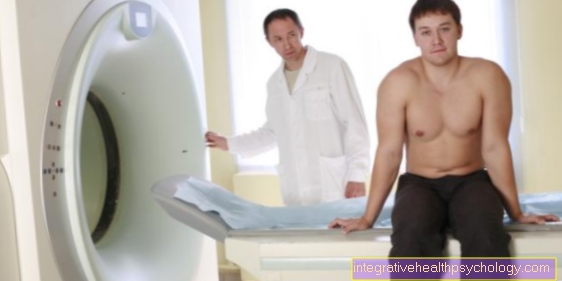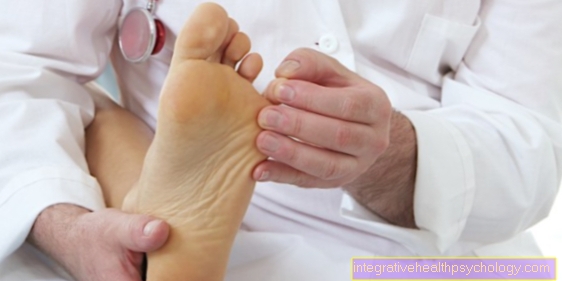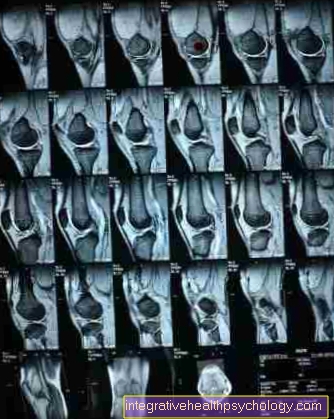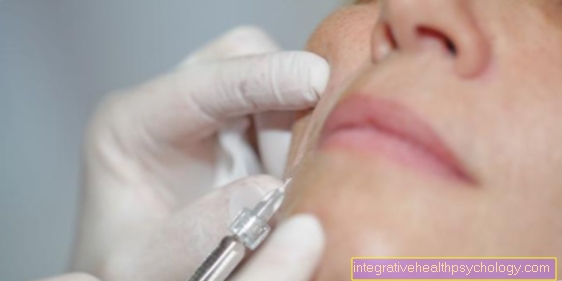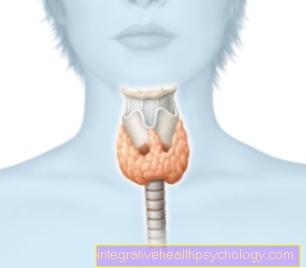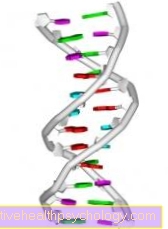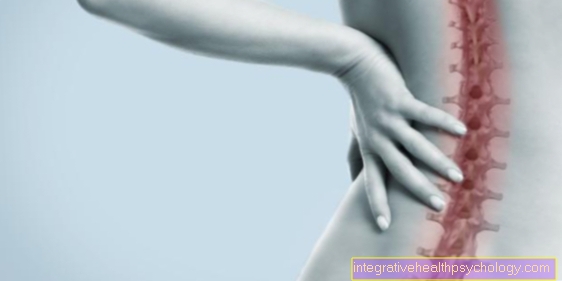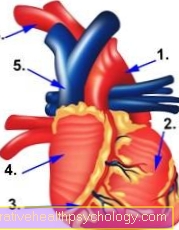Vitamin D diarrhea
introduction
Diarrhea can have a number of causes. Among other things, it can occur as a side effect when taking different drugs. Diarrhea can also occur as an undesirable effect when taking vitamin D.
In this case, however, the diarrhea is usually short-lived. Long-term diarrhea while taking vitamin D can indicate an overdose.
First of all, it is advisable to ask yourself what significance vitamin D has for the body. Please also read the article under: Vitamin D - what is it?

Causes - Why does diarrhea occur when taking vitamin D?
When vitamin D is mentioned, the active ingredient colecalciferol is usually meant. This is the most important form of vitamin D. All common vitamin D preparations contain colecalciferol as the main active ingredient. Colecalciferol is a well-tolerated drug, but - like any other drug - it can have undesirable effects that occur more or less frequently.
Diarrhea is one of those side effects. The mechanism by which diarrhea develops has not been investigated. Since diarrhea is an extremely unspecific symptom that can have various causes, the question of the cause is not expedient. It is not uncommon for the diarrhea to be caused by another cause, not taking medication, such as stress.
The side effects that can occur in the context of vitamin D intake often only occur in the context of an overdose. So if either too high a dose is taken or if the intake is not indicated if the vitamin D level is high enough. Vitamin D should therefore only be taken if there is a reasonable indication. This is particularly the case with infants and possibly the elderly and people with certain conditions such as osteoporosis.
The beginning of taking vitamin D should be discussed in advance with the treating doctor.
Vitamin D supplements are often taken without an indication. However, this overdose can cause serious consequences. Learn more about vitamin D overdosing at: Vitamin D Overdose - What To Look For!
Can Vitamin D Deficiency Cause Diarrhea?
In principle, numerous diseases can cause diarrhea. Whether diarrhea occurs as part of a vitamin D deficiency, however, varies greatly from person to person. There are people whose stomachs are sensitive to many things. If people often react with diarrhea to things like stress, changed eating habits, or medication, they are more likely to have diarrhea even if they are vitamin D deficient.
However, diarrhea is a very unspecific symptom that alone does not indicate an existing vitamin D deficiency.
In Germany, the number of people suffering from vitamin D deficiency is increased. This fact is usually based on the low contact with sun rays. A vitamin D deficiency should be treated immediately, as this can lead to consequences such as bone loss. For this, read the article under: Vitamin D Deficiency - Is It Dangerous?
Diarrhea disease progression due to vitamin D.
Long-term use of vitamin D in therapeutic doses rarely results in persistent diarrhea. If the diarrhea persists for more than a week while taking vitamin D, you should consult your doctor. He can then decide how to proceed.
The diarrhea can also have another cause. Find out more at: Abdominal pain and diarrhea - what's behind it?
Diagnosis of diarrhea by using vitamin D.
If you started taking a vitamin D (colecalciferol) preparation and diarrhea occurs shortly afterwards, the time correlation can be an indication of the cause, i.e. the medication intake.
However, numerous other incidents can also be the cause of the diarrhea, for example acute stressful situations, gastrointestinal infections or a change in diet. In order to find out whether the vitamin D intake is the cause, it can make sense to pause the preparation for a few days and then start taking it again.
If the diarrhea disappears in the days without vitamin D intake and only occurs again after starting the intake again, it can be assumed that the drug - or one of the additives it contains - is causing the diarrhea. It should then first be critically questioned whether the intake is even indicated.
Treatment of diarrhea with vitamin D.
If severe diarrhea occurs after taking colecalciferol, you should first check whether the recommended dose or an excessively high dose has been taken. In addition, one should always critically question whether vitamin D intake is necessary at all.
If the diarrhea does not result from an overdose, the next step is to try to switch to another colecalcferol preparation. Every drug has additives that differ from preparation to preparation. It is therefore not infrequently the case that a preparation with the same active ingredient is better tolerated than another. In most cases, diarrhea can be treated as a side effect.
If the measures mentioned do not help, it should be noted that many medication-related side effects only occur during the first few days. The probability that the diarrhea will subside after a few days of taking vitamin D is therefore relatively high.
Like all other vitamin preparations, vitamin D should not simply be taken as part of a dietary supplement. This can lead to dangerous overdoses. Vitamins should only be taken - specifically - if a deficiency or a risk of developing a deficiency exists or is likely.
It is advisable to correct the vitamin D deficiency in advance. This is possible by staying in the sun. However, it is important that you also protect your body from the sun's rays. Find out how you can do this by reading the following article: This is how you can prevent sunburn
Symptoms accompanying diarrhea caused by vitamin D.
The intake of vitamin D - like the intake of other medications - can be associated with various undesirable effects.
In addition to diarrhea, the possible side effects of taking colecalciferol include:
- Constipation
- Flatulence
- nausea
- stomach pain
- itching
- skin rash
However, the side effects mentioned mainly occur in the context of an overdose and rarely as a permanent side effect with adequate dosage.
At this point you can read our next article on this: Abdominal pain and diarrhea
Abdominal pain and diarrhea from vitamin D.
Abdominal pain is also a symptom that can occur when taking vitamin D. As a rule, however, the undesirable effects of taking vitamin D mainly occur when there is an overdose.
Abdominal pain can also occur initially at the start of therapy without an overdose being present. We therefore recommend that you do not directly refrain from taking vitamin D, but rather relieve the stomach ache with home remedies. To find out how to do this, see: Home Remedies For Abdominal Pain - Which Are The Best?
Duration and prognosis of diarrhea from vitamin D.
As already mentioned, diarrhea, a side effect of medication, often only occurs during the first few days of use and disappears on its own after the body has got used to the intake.
Diarrhea, which occurs as a short-term side effect of taking vitamin D, is not dangerous.
In the elderly and children, however, care should be taken to ensure adequate fluid intake, since the very young or very old people cannot compensate for the loss of fluid that can occur with diarrhea as it does in healthy adults.
You can also find important information at:
- Diarrhea in the baby
- Home remedies to treat diarrhea
Recommendation from the editor
Additional information on the subject can be found at:
- Diarrhea after alcohol
- Causes of diarrhea
- Vomiting and diarrhea
- Stomach cramps with diarrhea
- Homeopathics for diarrhea


